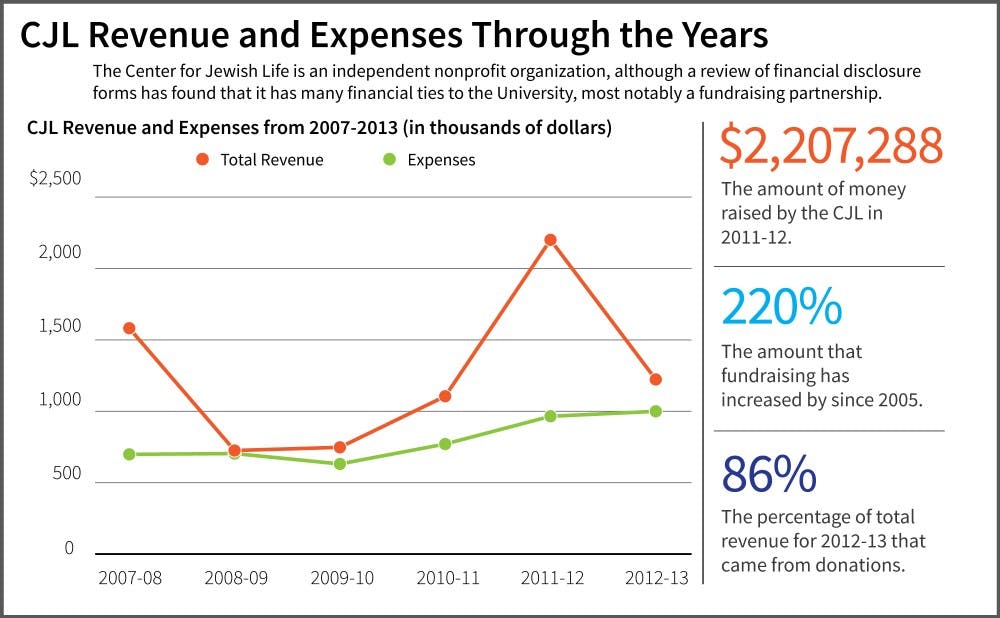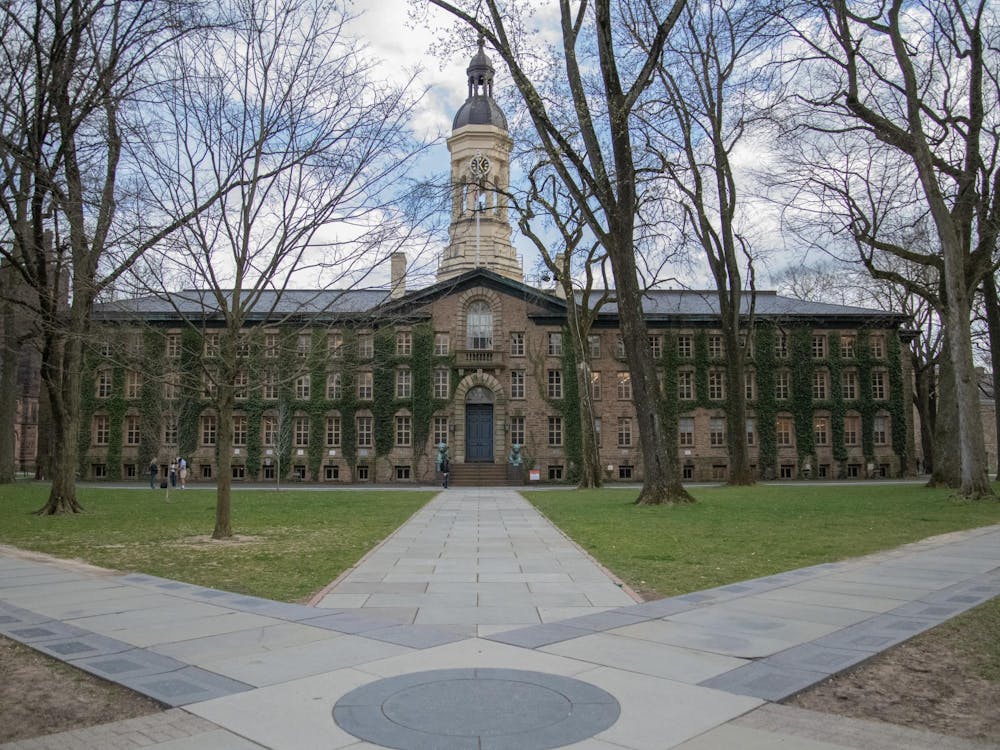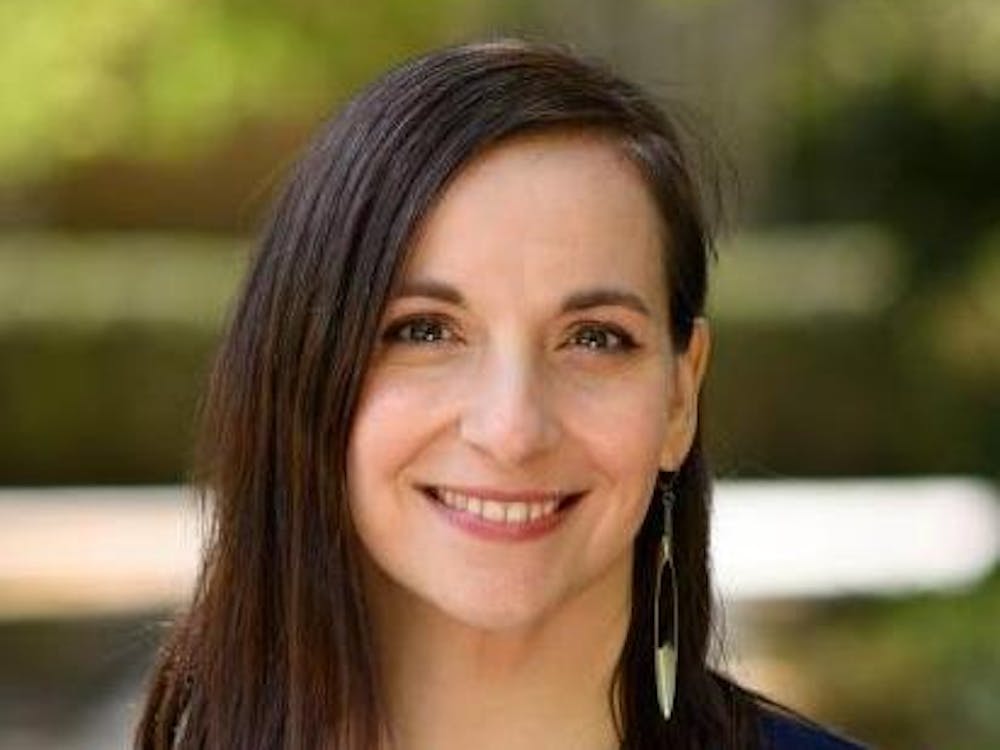The Center for Jewish Life maintains ties to the University, including a lucrative fundraising partnership, despite its official status as a separate nonprofit organization, a review of financial disclosure forms by The Daily Princetonian has found.
Meanwhile, the CJL's operator, a nonprofit calledHillel: The Foundation for Jewish Campus Life, has only contributed a few thousand dollars to the CJL in the past few years. The CJL's budget is financed almost entirely by donations.
Out of the center’s $1,224,172 revenue for the 2012-13 fiscal year, $1,053,024, or 86 percent, was from contributions and grants.
The CJL's policies towards Israel, as well as its recent campus activism and its ambiguous standing within the University community have been at the center of attention in the past few weeks.
A column by history professor Max Weiss last month alleged that Hillel's Israel Policy — which dictates its official standing towards Israel — had effectively censored him from participating in an event that was seeking sponsorship from both the University and CJL.In response, the CJL Executive Director rabbi Julie Roth, together with two members of its board, wrote that "the CJL will not ... sponsor groups or speakers that intend to harm Israel."
More recently, the CJL circulated a counter-petition in opposition to a proposalsigned by Weiss, among other faculty members, that encouraged the University to divest from "companies that contribute to or profit from the Israeli occupation of the West Bank."
Officially, the CJL is its own 501(c)(3) educational nonprofit organization -- the same status granted to the University -- and is one of many local chapters of Hillel, an international organization that connects Jewish student groups in colleges all over the world. Hillel International is currently represented at over 550 colleges and universities.
Most notably, the parent Hillel organization has only made irregular donations to the CJL for the past few years: $ 18,786 in 2010 and $5,425 in 2012, but none in 2011.
The bulk of the CJL's budget comes from donations which do not need to be disclosed by the receiver, only the giver, making it difficult to create a composite picture of the CJL's funding sources. The University does not donate money to the CJL, according to its own financial disclosure forms.
Roth, its executive director, is paid a salary directly by the CJL and is not an employee of the University.
Roth said that the CJL is financially independent from the University and that the center operates under policies it receives from its board of directors and its national office.Roth added that while the center partners with many different student groups, academic departments and University centers and offices, the relationship is largely programmatic.

The CJL staff and board members are also affiliated with the University. Roth said that she, as the Jewish Chaplain, and CJL staff, as affiliates, are expected to abide by University policies.
According to Dean of Religious Life and of the Chapel Alison Boden, who also serves as an ex officio member of the CJL board of directors, who the University owns and maintains the CJL building and has an agreement with Hillel — the national body — that it will staff and program the space. She could not be reached for further comment.
According to Roth, while policies decided by the center’s board of directors largely follow Hillel International’s policies, some, such as maternity leave policy or Israel policy, are modified to meet the specific requirements of the University.
The center’s Israel policy focuses more on promoting understanding and personal connection to Israel among the Jewish students, while the foundation’s policy more actively voices out political advocacy for the state of Israel, Roth explained.
According to theCJL’s 2012-13 annual report, the center’s fundraising efforts have increased by 220 percent since 2005, and its revenues have increased by more than 155 percent.
Notably, the center’s revenue almost doubled from $597,047 in 2009-10 to $957,255 in 2010-11 and doubled again to $2,023,856 in 2011-12.
The increase in center’s revenue coincided with the Aspire Campaign, a five-year University fundraising campaign led by former University President Shirley Tilghman that ended in June 2012.
The report says that the center had secured over $2,500,000 through the University's Aspire campaign.
Out of the center’s $1,224,172 revenue for the 2012-13 fiscal year, $1,053,024, or 86 percent, was from contributions and grants.
The center’s total expenses also increased from $629,427 in 2009-10 to $999,847 in 2012-13. While the expense for administration roughly stayed the same, expense for program services doubled from $482,086 in 2009-10 to $922,339 in 2011-12. The program services expense for 2012-13 was $747,918, which was 74.8 percent of the center’s total expense.
The partnership between Hillel and the University dates back to 1948, when the Student Hebrew Association joined the Hillel Foundation. Plans for the establishment of a Jewish center on campus were announced in 1986 after an ad hoc committee to study Jewish life on campus suggested that the creation of a Jewish campus center was necessary to unify the Jewish life on campus.
The CJL opened in February 1993, and was formally dedicated in 1994. The building is owned by the University but operated by Hillel. It is currently valued at slightly over $4 million, according to Mercer County Property Records.
Hillel at Princeton was granted a 501(c)(3) status by the Internal Revenue Service in 1966, before the construction of the CJL building.
Neither Hillel International nor the CJL made any donation to the University in the 2012-13 fiscal year.









